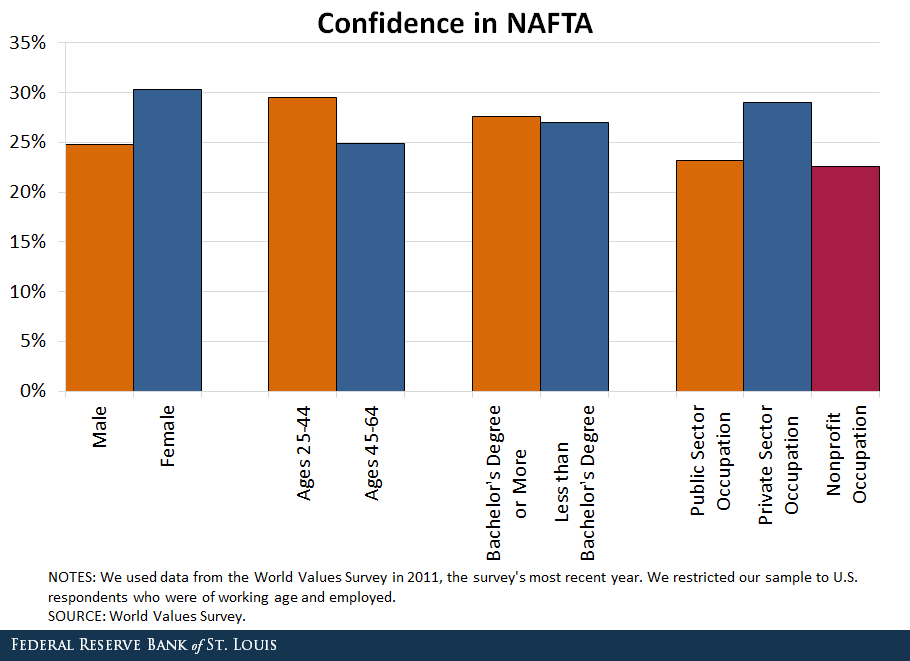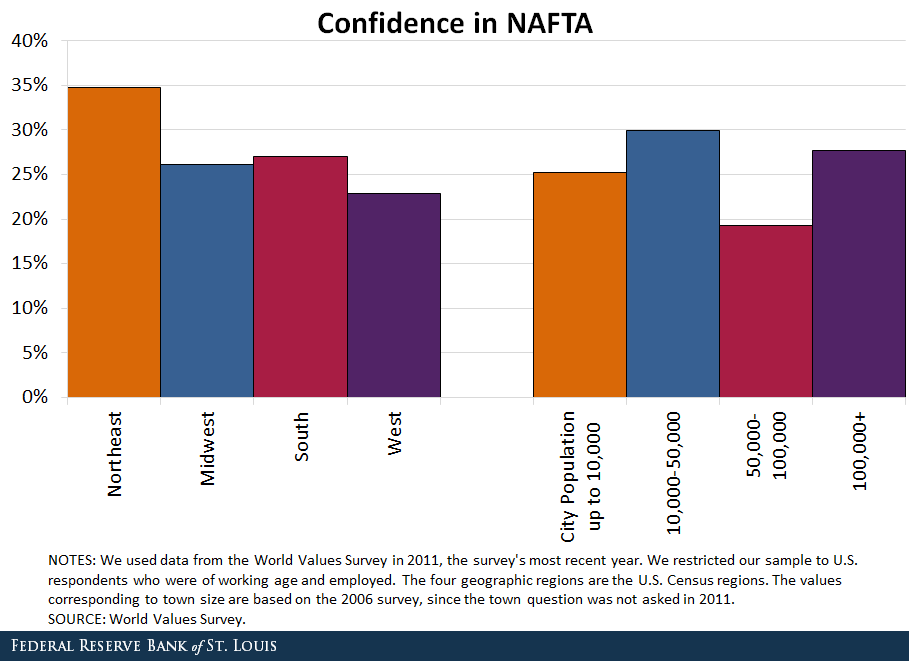How Do Americans Feel about NAFTA?

With the ongoing changes in U.S. trade policy, policymakers and academics alike have begun to pay increasing attention to Americans’ views on international trade.
In this post, we investigate Americans’ perceptions of the North American Free Trade Agreement (NAFTA). To do so, we used data from the World Values Survey to examine the perception of NAFTA across various subsets of the U.S. population in 2011, the survey’s most recent year.
The survey asks respondents to indicate their “confidence” in NAFTA:
- A great deal
- Quite a lot
- Not very much
- None at all
The question, unfortunately, does not provide respondents with further details about the meaning of “having confidence” in NAFTA. Still, we interpreted the responses as a broad measure of the extent to which the U.S. population supports NAFTA.
Because the first two options are so similar, we lumped them together into a “confident” group. Moreover, we restricted attention to employed individuals of working age (25 to 64) to focus on the perceptions of NAFTA among those with greater attachment to the labor market. Our sample consisted of 1,013 individuals.
The table below displays U.S. respondents’ overall perception of NAFTA.
| Confidence in NAFTA | ||
|---|---|---|
| Confident | Not Very Confident | No Confidence |
| 27.3% | 55.7% | 17.0% |
| NOTES: We used data from the World Values Survey in 2011, the survey's most recent year. We restricted our sample to U.S. respondents who were of working age and employed. | ||
| SOURCE: World Values Survey | ||
| Federal Reserve Bank of St. Louis |
||
Despite the many advantages of international trade openness advocated by economists and policymakers alike, we found that only slightly more than a quarter of U.S. respondents had a positive perception of NAFTA.
In the figures below, we examine the perceptions of NAFTA across various subsets of the U.S. population:
- Gender
- Age
- Education
- Type of employer
- U.S. region
- City size


We found that respondents’ perception of NAFTA was surprisingly robust across various subsets of the U.S. population.
In particular, we found that the perception of NAFTA was largely independent of each of the subsets we studied. This contrasts sharply with attempts by economists and policymakers to understand political trends from the lens of partitions of the U.S. population into “winners” and “losers” from international trade. While these findings suggest that the U.S. population has largely had a uniform experience of NAFTA, they also point to the limitations of our data and approach. In particular, asking individuals directly about their perception of particular policies may not be as informative about their actual impact as directly investigating outcome-based evidence on their labor market experiences. Further research needs to be conducted to better measure the impact of NAFTA across different groups of the U.S. population.
It is important to emphasize that these findings reflect Americans’ perceptions of NAFTA in 2011. More research needs to be conducted to obtain a more recent picture of Americans’ perceptions about the broad impact of international trade openness that extends beyond the impact of NAFTA.
Notes and References
1While these findings suggest that the U.S. population has largely had a uniform experience of NAFTA, they also point to the limitations of our data and approach. In particular, asking individuals directly about their perception of particular policies may not be as informative about their actual impact as directly investigating outcome-based evidence on their labor market experiences. Further research needs to be conducted to better measure the impact of NAFTA across different groups of the U.S. population.
Additional Resources
- On the Economy: The Weakening of the US Dollar
- On the Economy: The Evolution of U.S. Agricultural Exports
- On the Economy: When Does Trade Adjust after Being Liberalized?
Citation
Fernando Leibovici and Jonas Crews, ldquoHow Do Americans Feel about NAFTA?,rdquo St. Louis Fed On the Economy, May 10, 2018.
This blog offers commentary, analysis and data from our economists and experts. Views expressed are not necessarily those of the St. Louis Fed or Federal Reserve System.
Email Us
All other blog-related questions


